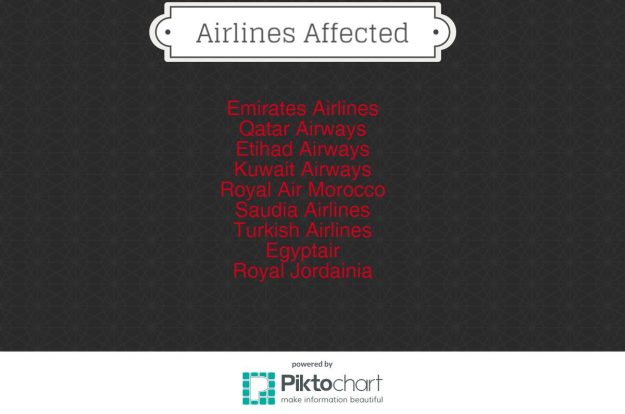On the 20th of March it was revealed that a confidential email had been circulated from the US Transport Safety Administration, which announced new measures causing airlines operating out of ten different major Middle-Eastern airports to forbid passengers carrying on any electronic devices larger than a cellphone on flights to and from the US. Any such devices, such as Ipads, Kindles and laptops would have to be transported in the hold of the plane.
The official reason given for this new measure by the US government was one of security, namely the possibility of such devices being used to smuggle explosives onto a plane. The Guardian reported at the time that a State Department official pointed to “several terrorist events on airplanes in the last year” as the motivation for these new safety measures, but when a Homeland Security official was later pressed on this, the official was only able to name one such incident, an explosion resulting in a single death on a Somali carrier called Daallo that does not fly to the US.
Furthermore, experts on air safety have been perplexed by the move, pointing out that a determined terrorist could easily detonate such a bomb remotely using their mobile phone. Additionally the fact that the measure only applies to flights to and from specific airports rather than all flights to and from the US means there is nothing stopping a would-be terrorist flying from one of the listed airports and then taking a connecting flight not affected by this new measure. Indeed, if anything this new measure will reduce flight safety due to the fire risk posed by lithium batteries among the airplane’s cargo.

In the face of precious little security justification the idea that this new ban is part of efforts by the Trump administration to discriminate against individuals travelling from the Middle East to the US has gained a great deal of traction. It should be noted however that this new electronics ban does not cover any airports in the six countries listed in the current proposed travel plan. In fact the United States enjoys good relations with all the countries affected by this new electronics ban, suggesting that the simple bigotry many people suspect to being behind the travel ban may not be the primary motivation for this new plan.
So if this new ban is not meant to make US citizens safer and is not motivated by a petty desire to inconvenience travelers from the Middle East, what possible reason could there be for this new ban? A third explanation is that is new measure is a thinly veiled protectionist measure. Many of the airlines affected, particularly Gulf carriers such as Emirates Airlines, have been expanding services in the US and out-competing American airlines.
In putting such a ban in place, the US government may be looking to secure an advantage for US airlines for flights to and from the US. ‘If you want to work on your laptop on your flights to the US, fly on United Airlines, not Turkish Airlines’. Indeed, there is reason to believe that this ban could simply be the first action in a full on “American First” US airline policy.
Since his election, the American airline industry has pressured President Trump to rewrite the 1992 Open Skies agreement, an agreement that opened up American airlines to much greater domestic competition from foreign airlines. The justification for such a seemingly blatant act of protectionism over free trade is the accusation that many of these Middle-Eastern airlines enjoy unfair advantages over their competitors in the form of financial assistance from their governments.
According to the lobbying group Partnership for Open & Fair Skies, Emirates airlines has enjoyed direct subsidies from the U.A.E. government to the tune of $6.8 billion in the 2004-14 period. This is in addition to benefiting from other advantageous U.A.E. laws such as a ban on unions, “exemption from competition laws” and the “absence of independent regulatory oversight.”
All in all it does seem like the Trump administration is keeping to it’s promises of ‘America First’ economic policies and is gearing up for a rather underhand campaign against the competitors of the American airlines industry. This strategy may ultimately backfire however. Ameera Fouad, a MA student at Cardiff University from Egypt says that from her experience “most people from these countries prefer their own airlines rather than an airline that would just prohibit them from taking their basic needs” alluding both to the recent ban and the general heightened suspicions towards those from the Middle East since 9/11. She also remarked that while in practice the ban isn’t a serious inconvenience for passengers it does “give people a bad image of the US”.
